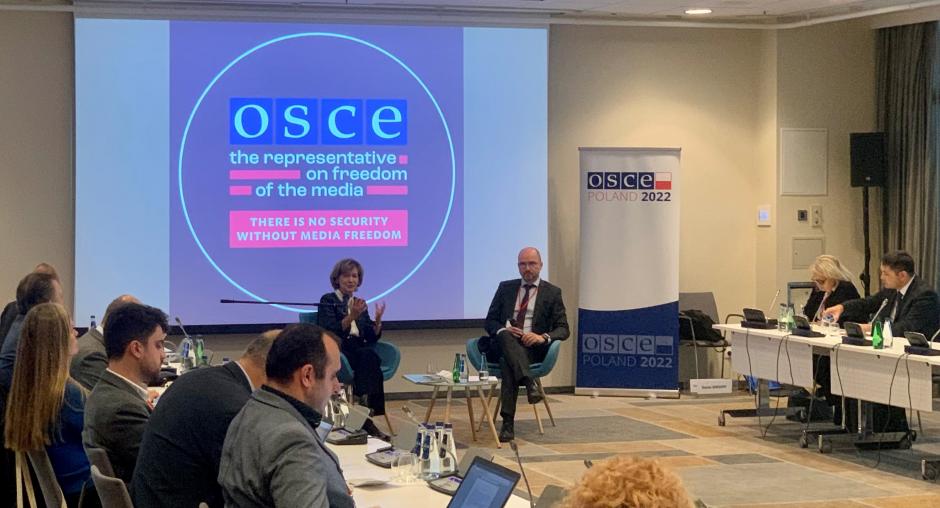Links between media freedom and democracy, safety of journalists, and encryption focus of OSCE Media Freedom Representative participation at Warsaw Conference

WARSAW, 30 September 2022 - The OSCE Representative on Freedom of the Media, Teresa Ribeiro, concluded today her participation in the Warsaw Human Dimension Conference, where she and her Office engaged in various discussions with OSCE participating States, civil society organizations, OSCE Institutions, representatives of inter-governmental organizations, and other stakeholders on a range of media freedom issues and challenges.
“The media and civil society have a hugely important role; we depend on them to ensure that OSCE participating States implement their commitments, and they alert us of misconduct and threats to media freedom,” said Ribeiro. “We all need to work together. That is why human dimension conferences like these are so valuable. Let me reiterate: without journalists being able to do their work there is no media freedom, without media freedom there is no security. More than ever we need to join forces to keep our democracies healthy and our societies secure.”
During a three-hour plenary session, the fundamental connection between democracy and media freedom was discussed. Following presentations by Damian Tambini, distinguished policy fellow in the department of media and communications at the London School of Economics and Gulnara Akhundova, regional director for Eastern Europe at International Media Support, participants discussed the current situation of freedom of expression, freedom of the media and media pluralism in the OSCE region and how OSCE participating States can better uphold their commitments in this regard.
During a roundtable on safety of journalists, the Representative discussed her Office’s new project on the topic. The roundtable also provided an opportunity to elaborate on diverse challenges to journalists’ safety and to identify common actions to promote and ensure it.
In another session, the role and impact of professional journalists and media in the context of international armed conflicts were discussed. The panel drew upon the courageous work and reflections of journalists covering the Russian war against Ukraine, including their role in enabling accountability for possible human rights abuses and war crimes. The session also explored personal goals, the remit of professional standards of war reporters, as well as their coping strategies in dealing with the horrors of the war.
Finally, the Office organized a side event that explored how encryption technologies and advancements such as end-to-end encryption have proven pivotal for protecting freedom of expression and privacy in the digital age. The participants discussed challenges arising from laws and practices that are leading to an erosion of encryption, risking weakening the role of the media and investigative journalism across the OSCE region. The session concluded that a lack (or perceived lack) of privacy can have a chilling effect and lead to self-censorship.
The OSCE Representative on Freedom of the Media observes media developments in all 57 OSCE participating States. She provides early warning on violations of freedom of expression and media freedom and promotes full compliance with OSCE media freedom commitments. Learn more at www.osce.org/fom, Twitter: @OSCE_RFoM and on www.facebook.com/osce.rfom.
